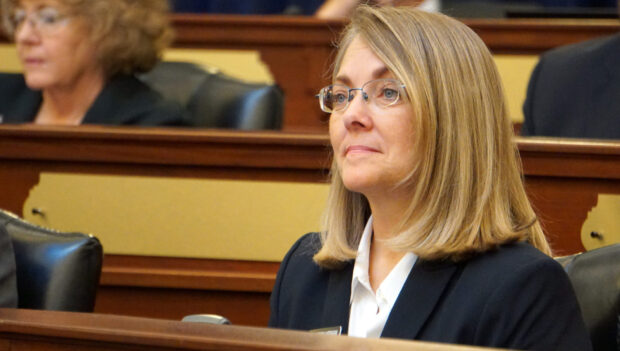Gov. Brad Little said public schools will be one of the few areas where he will consider new funding investments during the upcoming legislative session.
Speaking to a crowd of about 500 at the Associated Taxpayers of Idaho Conference on Wednesday, Little predicted a tight budget year and pledged not to spend money — or repeal the sales tax on groceries — until there is enough money in the bank to cover the costs.
But, Little said, it is important to continue to make strategic investments where they matter most.
“I won’t reveal too much about my budget recommendations and my specific legislative agenda for the upcoming session, but I can tell you this: education will remain my top priority and you are guaranteed to see me push for significant investments in our teachers and literacy efforts,” Little said.
The ATI conference is a closely-watched tradition that is touted as a sort of unofficial kickoff to the legislative session. The annual conference attracts a powerful and plugged-in audience of legislators, business leaders, lobbyists and other influential Idahoans.
Little also used the ATI conference as a chance to briefly weigh in on the work of his ”Our Kids, Idaho’s Future,” K-12 education task force. Last month, the task force approved five education recommendations that touch on topics like teacher pay and all-day kindergarten.
Little said the task force “worked hard” and he called the five recommendations “solid.”
“I am reviewing the recommendations, which weigh heavily on my decision about future funding recommendations and legislative ideas for the upcoming session,” Little said.
Outside of K-12 education circles, funding is expected to be tight during the upcoming session.
This fall, Little instructed state agencies that use state general fund dollars — other than public schools and some other notable exceptions — to implement a 1 percent budget rescission and to reduce base spending levels by 2 percent for 2020-21.
“The reduced spending is not a holdback, it is a way to avoid holdbacks, which are extremely disruptive to government operations and citizens impacted by government services,” Little said Wednesday. “It is important for me that all entities that receive general funds find efficiencies in their budgets and tighten things up in anticipation of any reduced revenues.”

Rep. Wendy Horman, the Idaho Falls Republican who serves as the House vice chair of the Joint Finance-Appropriations Committee, said Little’s ATI speech didn’t include many surprises because he highlighted his established priorities of education and workforce development. She and other legislators will look to Little’s Jan. 6 State of the State address to have a better sense of his agenda for 2020.
“The Legislature’s job and concern will be making sure we are investing in those things that will yield better outcomes for our students,” Horman said. “We will want to see evidence that we will see improvements.”
Horman, who served on Little’s education task force this summer, said budget realities may affect what the Legislature is able to do in terms of moving task force recommendations forward for implementation.
“The budget situation, that’s certainly influenced some of my votes on that task force and it’s got to be giving (Little) pause as well in terms of how much can we afford to invest and what should the priorities be,” Horman said.
